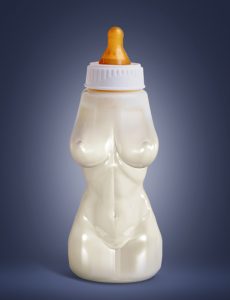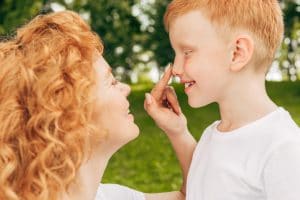
The challenge
My first son had difficulty latching and I had to use a nipple shield with him for months (cue shame). After about six weeks of nursing every two hours, I hit a physical and psychological wall. I knew I had to get some sort of break, so I asked my husband to take one feeding per night using formula (yet again more shame). I had tried pumping but it took multiple sessions to get enough to fill a bottle.
With my second son I was prepared for the challenges at least, but still hoped that more experience would make it easier. It was not easier – I endured six solid weeks of bleeding nipples and piercing pain when he latched. However, I did have the hindsight to know that it would all work out okay in the end. Indeed, once we both got the hang of nursing, he was a champ and didn’t wean until he was almost two years old.
New evidence
After experiencing all this I was so glad to see a recent article in the Washington Post from several reproductive psychiatrists that brought up the issue of mothers’ value to their babies beyond the breast. They wisely point out that the “mother-baby bond is comprised of healthy mothers and babies”. In particular, they highlight that;
“a mother’s mental health is crucial—not just to her, but also to her baby. A depressed and anxious mother isn’t able to provide the nurturing that her baby needs to develop and grow. And if that depression and anxiety is caused or worsened by the breastfeeding experience, breastfeeding isn’t worth it.”
Finally, a realistic perspective from a medical professional that goes beyond “breast is best.” From a developmental point of view, we know that the mother-baby bond is developed slowly, over the course of months in a subtle, beautiful fashion that involves the close observation of the mother reading the signals of her baby as he/she adapts to the world. This happens most effectively if the mother is physically and psychologically present enough to pick up on these signals. If the struggle to breastfeed impairs a mother from doing these things, then it seems the breast milk itself is coming in spite of, instead of as part of this beautiful bond.
New research is also helping us understand that some of the benefits of breastfeeding are not solely due to the milk itself. One study found that some of the cognitive benefits of breastfeeding for babies had to do with other parenting practices that were associated with it. For instance, actions like responding quickly to babies’ emotional cues and reading to babies from a very young age were associated with breastfeeding and explained some of its brain-building benefits. As we all know, you can do these types of parenting practices as a bottle-feeding mum, just as easily as a breastfeeding mum.
A fresh outlook
What all this really opens up for us is a broader understanding of what motherhood means. My struggle with breastfeeding taught me that part of being the best mother possible includes a healthy dose of self-care. Caring for myself helps me have the resources to be fully present for my kids. Breastfeeding is a natural, beautiful part of motherhood, but it should not be the litmus test for what it means to be a “good” mother. Motherhood, and parenting in general, is less about the “black-and-white” and more about shades of grey. Good, responsive parenting can reveal itself in variety of ways, most of which center on the relationship with each unique child. Breastfeeding can be a lovely part of that relationship, but it is not the only piece. The pieces are woven together over years of feeding, bathing, reading, listening and lots and lots of patience.
Are you struggling to breastfeed?
The Australian Breastfeeding Association offers support and services, including a breastfeeding helpline (1800 686 268).













